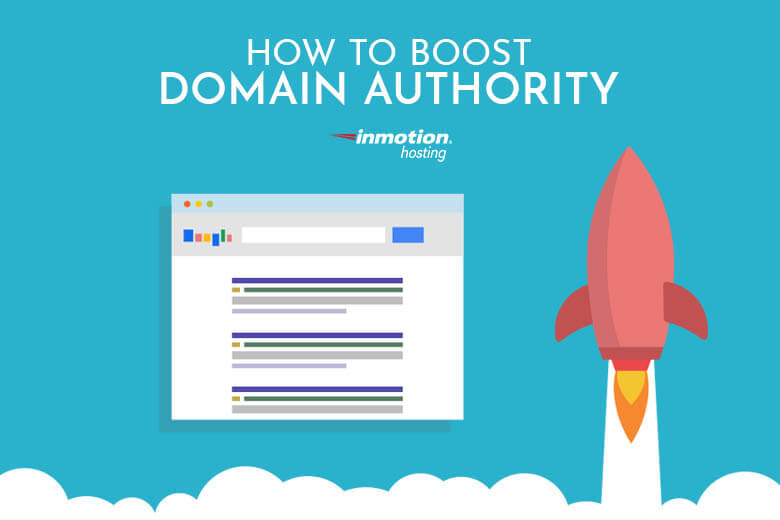
In the ever-evolving digital landscape, where every click matters, achieving a prominent online presence is non-negotiable. Your website’s Domain Authority (DA) plays a pivotal role in determining its search engine ranking and overall visibility. At InMotion Hosting, we understand the significance of Domain Authority as an essential building block for your online success. In this blog post, we will take you on a journey through the realms of Domain Authority, its intricate relationship with SEO strategy, and how InMotion Hosting can help you enhance your website’s Domain Authority for unmatched online prominence.
We’re going to tell you everything you need to know about domain authority, from how it’s calculated, to how to improve your score. Here’s what you need to know:
What is Domain Authority?
Domain authority is not just a mere number; it’s a reflection of your website’s credibility and trustworthiness in the eyes of search engines. Developed by Moz, Domain Authority measures your website’s potential to rank higher on search engine result pages (SERPs). The scale ranges from 1 to 100, with higher scores indicating stronger authority and better chances of ranking prominently. It’s a comprehensive evaluation that takes into account various factors, including your website’s backlink profile, content quality, and user experience.
Domain authority is calculated using several different factors including the number of high-quality external links that are directing traffic to your website. Besides thinking about the ranking as a means of judging SEO, you can think of it as a comparison snapshot to how well you are doing versus other websites in the same category (i.e., your competition). If you compare your score to their score, you can get a feel for who will come out higher on the search engine results.
Here are a few facts about domain authority to help you better understand how it works:
- Moz uses over 40 metrics to arrive at their score, including MozRank, MozTrust, and other Moz proprietary factors.
- Despite the complicated metrics, DA is thought to be mainly influenced by the quality of your website’s links.
- Sites are ranked on a scale of 1-100, and it’s very difficult to get a perfect score.
- The higher you move up on the scale, the harder it is to improve your rank…
…but that doesn’t mean you can’t improve your score. In fact, there are several proven tactics to help you do so.
How to Find Your Domain Authority
If you want to improve your site’s Domain Authority, it’s helpful to first know what your DA is. Finding your Domain Authority is a straightforward process that involves using specialized tools and platforms. One of the most widely used tools for this purpose is Moz’s Link Explorer. Follow these steps to find your Domain Authority:
- Visit Moz’s Link Explorer: Go to Moz’s Link Explorer on your web browser.
- Enter Your Website URL: In the search bar provided, enter the URL of the website for which you want to check the Domain Authority.
- Click “Search”: Once you’ve entered the URL, click the “Search” button.
- View the Results: The results page will display various metrics related to your website’s authority, including Domain Authority. You’ll find your website’s Domain Authority score on a scale of 1 to 100, along with additional insights into your backlink profile and other relevant data.
When the results page pops up, your DA will be listed under the “Authority” heading. If your site is brand new, it will likely have a fairly low rank. If you’ve been working on building links and authority for a while, it might be somewhere in the middle.
Remember that Domain Authority can vary over time due to changes in your website’s backlink profile and other factors. Regularly monitoring your Domain Authority can help you track your progress in the realm of online authority.
No matter what your score is, these are the steps you can take to improve it.
Tips to Boost Your Domain Authority
Boosting your Domain Authority requires a strategic approach that focuses on improving various aspects of your website’s online presence. Here are some effective techniques to boost your Domain Authority:
Perform a Link Audit
If you want a great DA ranking, you need a healthy link profile. What does that mean? Your link profile is all of the backlinks your site has earned, and a “healthy” link profile is one that adheres to Google’s guidelines.
There are some backlink strategies, which Google refers to as “schemes,” that will get your site penalized, including:
- Buying or selling links that pass PageRank, including exchanging money for links or posts that contain links
- Excessive link exchanges (“link to me and I’ll link to you”)
- Using automated programs to create links to your site
- Hidden links embedded in widgets
- And more (see the full list here)
There are several tools you can use to perform a link audit, like SEMrush Backlink Audit and Majestic.
If you find any links that qualify as a “scheme” (and it’s likely you will), it’s important to disavow them to help raise your ranking.
Remove Toxic Backlinks
Regularly audit your backlink profile to identify and disavow any toxic or spammy links. Such links can have a negative impact on your Domain Authority and overall SEO.
Make Sure Your SEO is Up To Par
According to Moz, in order to improve your DA, you have to improve your overall SEO. Ensure your website is technically sound by optimizing its speed, mobile-friendliness, and overall user experience.
Other important SEO elements include overall site structure and navigability, meta tags, header tags, alt tags, keywords, and more.
A well-optimized website is more likely to attract and retain visitors, which can indirectly contribute to your Domain Authority.
Create Quality Content
It should go without saying that if you want people to link back to your content, you have to first create content that people will want to link to. That means your work (whether it’s blogs, infographics, videos, or something else) needs to be high-quality and that you need to produce a lot of it.
Create relevant content that addresses the needs and interests of your target audience. Engaging and informative content encourages other websites to link back to your pages, which can positively impact your backlink profile.
Link to Your Own Content with Internal Linking
Just as important when it comes to DA is quality internal links. What that means is linking back to your own content within one of your posts – for example, when we provided the link for our SEO blog above, that was a backlink.
Implement a strategic internal linking structure helps guide visitors through your website’s content. Internal links help distribute authority across different pages and improve user navigation, which can positively influence your Domain Authority. Internal linking also helps search engines crawl your site.
Social Media Counts
Having a strong social media presence can contribute to increased traffic and potential backlinks. Engage actively on social media platforms to increase your content’s visibility and encourage sharing.
If your content is regularly being shared and clicked on, it helps to create more awareness around your website and content. Consider using social media platforms that make the most sense for your business, and focusing on making a difference there instead of across all platforms.
Building Domain Authority Takes Time
Once you’ve followed the steps above, it’s time to sit back and wait. Building DA is a long-term game and you’re not going to see immediate results. In fact, you may notice that other websites who have been around longer than you have a higher authority – with age comes more authority. When you have a website over a long period of time, regularly updating it with new content, this can help!
In the meantime, your increased level of content and improved SEO will keep driving new and repeat visitors to your site and establish a stronger online presence in your industry. Enjoy the ride!
